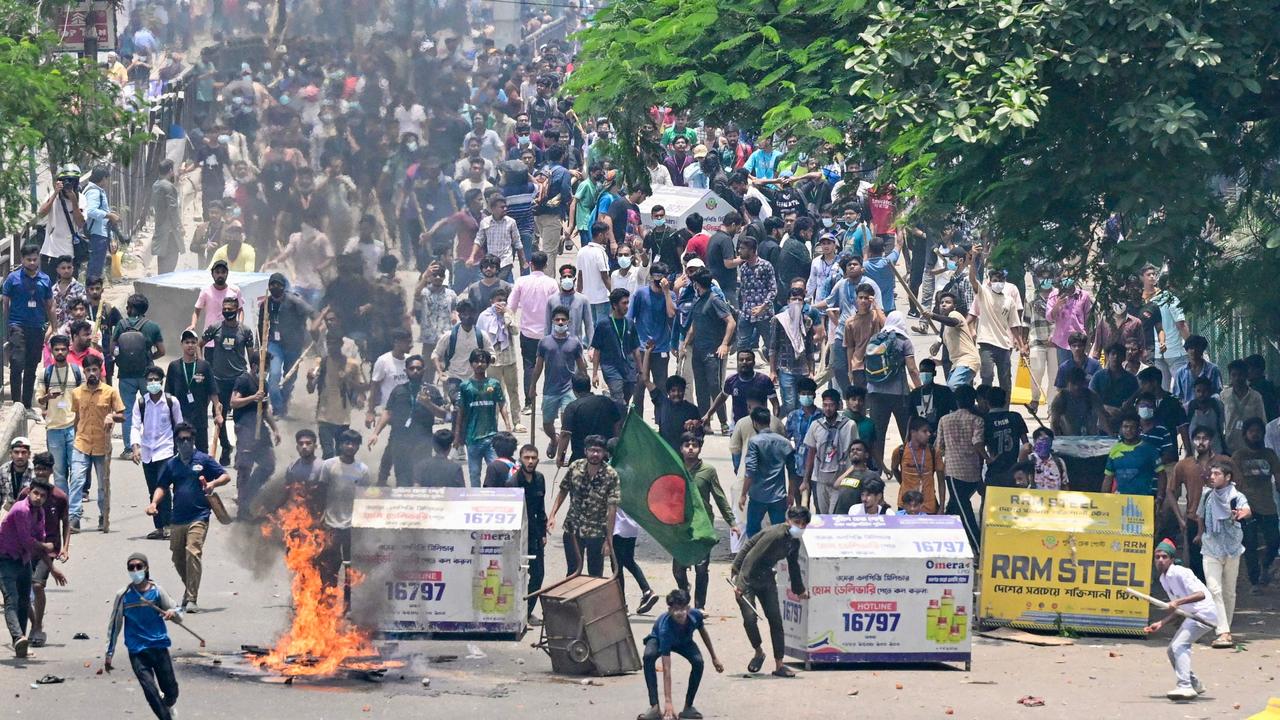Fires, beatings and 39 dead as violent student protests rock nation
The nation has been “cut off from the world” amid deadly clashes between police and students. Warning: Graphic
Beatings on the street. Buildings and cars on fire. Tear gas and rubber bullets fired. A mounting death toll.
These are the frightening scenes currently coming out of Bangladesh.
Violent clashes between students and police and counter-protesters in support of the ruling political party Awami League have led to at least 39 deaths, according to international news agency AFP, reporting from Dhaka. Many more have been injured.

Students in the South Asian nation are protesting against a quota system for jobs in the civil service, which are sought-after because they are stable and well-paid.
They say the system – which reserves more than half of the government jobs for specific groups, including 30 per cent for children of veterans who fought in the country’s 1971 liberation war against Pakistan – favours allies of Prime Minister Sheikh Hasina’s government.
Students instead want a system based on merit.


Schools and universities across the country have been ordered to close until further notice and Ms Hasina gave a national address in an attempt to calm the violence this week.
She said she condemns every “murder”.
“I firmly declare that those who carried out murders, looting and violence – whoever they are – I will make sure they will be given the appropriate punishment,” she said.
But a day later, Bangladeshi students set fire to the head office of the state-run Bangladesh Television, which aired the speech.
Police had fired rubber bullets at hundreds of protesters, but they fought back and chased retreating officers to the headquarters of the broadcaster in the capital of Dhaka.
“Our first demand is that the prime minister must apologise to us,” protester Bidisha Rimjhim, 18, told AFP.
“Secondly, justice must be ensured for our killed brothers,” she added.
At least 32 people were killed on Thursday alone, according to an AFP tally based on hospital data.
Police weaponry was the cause of at least two-thirds of those deaths, based on descriptions given from hospital figures.

Rights group Amnesty International said video and photographic evidence from clashes this week showed that Bangladeshi security forces had used unlawful force.
Witnesses that Amnesty International spoke with also claimed protesters were peaceful before individuals from the Bangladesh Chhatra League, a group affiliated with Awami League, started attacking them at Dhaka University on July 15.
One example of the violence Amnesty International heard about was a first-year university student found lying on the street while “vomiting incessantly and struggling to breathe”.
“We recovered his phone from his pocket which was completely smashed into pieces,” an unnamed witness said. “Imagine the kind of force it needs to break a phone into pieces while it’s inside someone’s pocket.”

The internet has also been shut down in the country in what is understood to be an effort to prevent students from communicating and organising protest activities via social media.
“Metrics show Bangladesh has now been cut off from the world for over six hours, with a nation-scale internet shutdown in effect amid student protests,” London-based internet monitor NetBlocks said on X, formerly Twitter, just before 8am AEST.
“The disruption prevents families from contacting each other and stifles efforts to document human rights violations.”
NetBlocks had confirmed in the early hours of Friday AEST, that live network data showed a “near-total national internet shutdown”.
âš ï¸ Update: Metrics show #Bangladesh has now been cut off from the world for over six hours, with a nation-scale internet shutdown in effect amid student protests.
— NetBlocks (@netblocks) July 18, 2024
The disruption prevents families from contacting each other and stifles efforts to document human rights violations. pic.twitter.com/NDXzN8ldTh
Zunaid Ahmed Palak, who is the state minister for telecommunications and information technology, said earlier mobile internet had been “temporarily suspended” and services would only be restored once the situation returned to normal, Al Jazeera reported.
Attempting to access local news coverage, news.com.au discovered Bangladesh news websites were also down, including the largest circulating English-language newspaper in the country, The Daily Star, and Dhaka Tribune, an English-language newspaper based in the country’s capital.

The current quota rules were introduced in 1972 by independence leader Sheikh Mujibur Rahman, who is the father of current Prime Minister Sheikh Hasina.
Protests by students in 2018 prompted Ms Hasina’s administration to cut down the quota scheme.
But last month, the High Court ruled that this change had been unlawful and ordered the government to reintroduce the freedom fighter category it had abolished.
This meant the 30 per cent quota in government jobs for the children of veterans was back.
Reacting to the violence, UN spokesman Stephane Dujarric appealed for “restraint from all sides”.
“We urge the government to ensure a conducive environment for dialogue. And we encourage protesters to engage in dialogue to resolve the deadlock,” he told reporters. “Violence is never a solution.”
– with AFP






